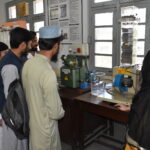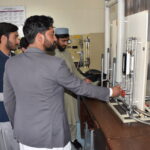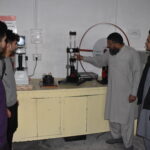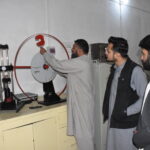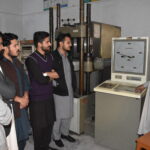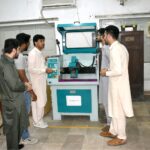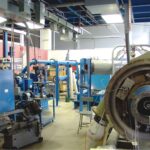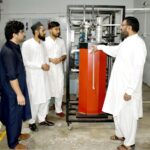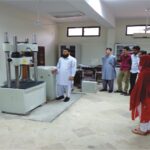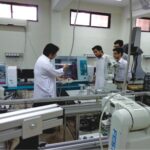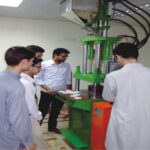Faculty of Mechanical, Chemical and Industrial Engineering
Browse Links
NEED ASSISTANCE?
(+92-91) 9216796-8
Message From DEAN
Faculty of Mechanical, Chemical and Industrial Engineering (FMCIE) is one of the dynamic faculties of the University of Engineering and Technology, Peshawar. The faculty consists of seven teaching departments, spread over Main Campus Peshawar, Nowshera Campus and Hayatabad Campus including state of the art research centre in energy, robotics, rapid prototyping, gas. The faculty members are well-qualified and dedicated to teaching and research in their respective areas. Our Alumni are working in their respective professional areas across the globe and providing excellent feedback for Continual Quality Improvement (CQI) of our programmes. The excellent integration of alumni, students, faculty members and industry under Outcome-Based Education (OBE) ensures sustainable CQI of the programmes and makes them attractive for prospective students.
Prof. Dr. Rizwan Mahmood Gul
Dean, Faculty of Mechanical, Chemical & Industrial Engineering
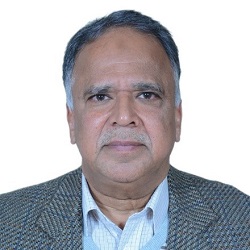
Faculty of Mechanical, Chemical & Industrial Engineering
FMCIE consists of six departments
- Department Of Mechanical Engineering (Peshawar)
- Department Of Mechanical Engineering (Jalozai)
- Department Of Industrial Engineering (Peshawar)
- Department Of Industrial Engineering (Jalozai)
- Department Of Mechatronics Engineering (Peshawar)
- Department Of Chemical Engineering (Peshawar)
Program Mission
“To develop graduates with relevant skills through transfer of broad, and in-depth knowledge, enabling them to contribute towards solution of complex industrial problems for sustainable development”
About Department
The field of Mechanical Engineering helps design, manufacture and maintain mechanical systems that cater to the needs of human society by the application of principles of engineering and allied sciences. The breadth of Mechanical Engineering ranges from the design and manufacturing of simple devices like injection catheters, switches and sensors to the high tech machines such as intelligent cars, power plants, satellites; the list is inexhaustible and the horizons limitless. The core of Mechanical Engineering encompasses the generation, conversion and utilization of mechanical and thermal energy, design of components and systems, and application of economically viable manufacturing and quality control processes. Mechanical Engineering is a diverse field that ingrains the cross cutting innovations in all fields of engineering and sciences. The Mechanical Engineering education therefore prepares a versatile engineer who is ready to take up the challenges of the ever changing world of technology.
Program Educational Objectives of Mechanical Engineering Department
Academic Programs
- B.Sc. Mechanical Engineering
- M.Sc. Mechanical Engineering
- Ph.D. Mechanical Engineering
Scheme of Studies
Laboratories
- Practical work in laboratories is an essential part of the curriculum. Almost all subjects taught are augmented by practicals in the laboratories. The Department is supported by well-equipped laboratories having state-of-the-art machinery and equipment. It has the following laboratories:
- Fluid Mechanics Laboratory
- Heat Transfer and HVAC Laboratory
- Thermodynamics Laboratory
- Mechanics of Materials Laboratory
- Mechatronics Laboratory
- Advanced Manufacturing Laboratory
- Mechanics of Machines and Vibration Laboratory
- Measurement, Instrumentation and Control Laboratory
- Metallurgy Laboratory
- Power Plants Laboratory
- Engineering Workshops
- Advanced Material Research Laboratory
- SNGPL Laboratory
- CAD Laboratories
Field Visits
Industrial visits are regularly conducted every year to broaden the horizon of students and to appraise them with the industry of Pakistan.
Mechanical Engineering Department Downloads
Faculty
Program Mission
“To produce industrial engineers having professional knowledge, research and problem-solving skills to play leading role for the economic well-being, safety and productivity of an organization and society”
About Department
Industrial Engineering (IE) is a field that integrates the technical, human, and management aspects of today’s sophisticated products and processes. It is at the heart of the systems that are essential to our society. From airlines to online retailers, from hospitals to manufacturers, from telecommunication companies to world-wide shipping companies, industrial engineers design solutions to improve the performance of complex systems of people, technology, and information. In fact, the need for any complex organization to raise its efficiency and productivity through scientific analysis has created a high demand for Industrial Engineers and made it one of the fastest growing career fields.
The Industrial Engineer is involved in designing or improving major systems that encompass the total organization, whether in the governmental or private sectors, or in the manufacturing or service industries. Consequently, an Industrial Engineer is often in contact with individuals from many segments of the organization. With their education and experience, Industrial Engineers develop a global view of many inter-related operations necessary to deliver a firm’s goods and services. Because of their management skills and global view of the organization, a large proportion of Industrial Engineers move into management positions, later advancing to top management positions, or to own and operate their own businesses.
Program Educational Objectives of Industrial Engineering Department
Academic Programs
- B.Sc. Industrial Engineering
- M.Sc. Industrial Engineering
- Ph.D. Industrial Engineering
Scheme of Studies
Laboratories
- Almost all subjects are augmented by practical work/tutorials. The students will be trained in the following laboratories:
- Central workshops
- Digital control laboratory
- Computer integrated manufacturing laboratory
- Metrology laboratory
- Ergonomics laboratory
- Non-traditional manufacturing laboratory
- Motion and time study laboratory
- Computer laboratory
Field Visits
Industrial visits are regularly conducted to broaden the breadth and depth of technical and practical Industrial Engineering knowledge. People from industries are also invited to share their practical experience with the students.
Faculty
Program Mission
“To produce well-rounded Mechatronics Engineers, such that they have the right set of skills built from the transfer of broad and in-depth engineering knowledge and hands-on practical work, hence, enabling them to contribute positively towards solving real life problems utilizing the proper research tools and methodology for sustainable development.”
About Department
Mechatronics Engineering is a relatively new field of study, and just like anything new, it draws both interest and skepticism. Many students, and parents alike, find it difficult to come to terms with the standing and importance of this field and the promise that it holds, both for the student’s and the country’s future. In very plain and simple words, Mechatronics Engineering is mostly about intelligent automation of manual labor. It is an integration of Mechanical, Electrical and Computer Engineering. This integration of three different disciplines of Engineering is driven mostly by the needs of modern industries, and the equipment and appliances that we come across in our daily lives, which are mostly electro-mechanical and are controlled by some kind of a computer that is embedded therein. So whether it is the air conditioner in your room, the ATM machine that you use to withdraw cash, the car that you drive around, your household cleaning robot, if you are lucky to have one, or the bottling plant at your favorite beverage company or any modern industry for that matter- you are looking at Mechatronics in action. Mechatronics Engineers are primarily trained to ensure the efficient operation of any modern industry. However, their skills and knowledge can be utilized in numerous other fields, such as, Biomedical Engineering, the design and development of unmanned, autonomous systems etc.
Funded by the Higher Education Commission of Pakistan, the Department of Mechatronics Engineering was established in 2007 at a cost of Rs. 140 million. It is located in Phase V of the Hayatabad township of Peshawar metropolis. Students of the Department are provided with a free shuttle service to the Main Campus of UET Peshawar. Around 75% of the Faculty members at the Department have received their PhD in relevant disciplines from well reputed international universities, whereas the remaining are working towards their PhD degree. Despite being one of the youngest departments of UET Peshawar, we feel proud to announce it that many of our graduates are working at some of the most prestigious organizations both in Pakistan and abroad, i.e., Schlumberger, PepsiCo, British American Tobacco Company, Tetra Pak, Bestway, and Atlas Honda etc., while many more are pursuing their higher education in some of the best universities in Europe, Australia, the Far East and North America.
Program Educational Objectives of Mechatronics Engineering Department
Academic Programs
- B.Sc. Mechatronics Engineering
- M.Sc. Mechatronics Engineering with specialization in Automation and Control
- Ph.D Mechatronics Engineering
Scheme of Studies
Laboratories
- Several laboratories have been set up to support the study of Mechatronics Engineering including the following:
- Electrical & Electronics Laboratory
- Instrumentation & Control Laboratory
- Mechatronics Design Laboratory
- Robotics Laboratory
- Computational Laboratory
- Manufacturing Automation Laboratory
- Microcontroller & Microprocessor Laboratory
- PLC Training Laboratory
Faculty
Program Mission
“To produce graduates of excellent technical, professional and scientific background in chemical engineering for the benefits of global society to work with the industry and community to help in boosting national economy and professional well-being”
About Department
Chemical Engineering is the branch of engineering, which blends the knowledge of basic sciences with engineering to develop, design, analyze and engineer the industrial processes and plants that turn raw materials into valuable products. These processes must be accomplished in safe, cost effective and sustainable manner to create products, which are useful and essential to the modern world. Chemical Engineering is based upon the fundamentals of mass, momentum, and heat transfer, thermodynamics and chemical kinetics. Chemical Engineers are equipped with the necessary skills that encompass detailed understanding of all aspects of design, testing, scale-up, operation, control, and optimization of different unit operations. They are familiar with many industries such as petroleum and petrochemicals, plastics, fibers, paper, food processing, building materials, water desalination and pharmaceuticals. A Chemical Engineering degree is also a good preparation for careers in pollution prevention and waste minimization.
Program Educational Objectives of Chemical Engineering Department
Academic Programs
- B.Sc. Chemical Engineering
- M.Sc. Chemical Engineering
- Ph.D. Chemical Engineering
Scheme of Studies
Field Visits
The Department is in close contact with government departments and private chemical industries. Field visits to chemical industries are arranged regularly, ranging across the whole country. Such field visits are found very helpful in broadening the vision of the students in the field of Chemical Engineering.
Faculty
Program Mission
“The center supports Pakistan’s economic development by strengthening the relevance and responsiveness of university products, including applied and policy research and skilled graduates, to the needs of the public and private sector. The center encourages and empowers women engineers and researchers to actively participate through equal opportunities.”
About Department
The US-Pakistan Center for Advanced Studies in Energy (USPCASE) at the University of Engineering and Technology (UET) Peshawar is a leading institution dedicated to addressing Pakistan’s critical energy needs through advanced research, education, and capacity building. Established in 2014 under a USD 20 million Cooperative Agreement between USAID and UET Peshawar, the Center aims to drive innovation and develop sustainable energy solutions that contribute to the economic and social development of Pakistan. The Center focuses on fostering an interdisciplinary approach to energy education and research, emphasizing practical applications and industry collaboration.
Program Educational Objectives of USPCASE
Academic Programs
- Bachelor’s degree in
- Energy Engineering
- Master’s degree in
- Renewable Energy Engineering
- Electrical Energy Systems Engineering
- Energy Management & Sustainability
- Thermal System Engineering
- PhD programs in
- Renewable Energy Engineering
- Electrical Energy Systems Engineering.
Scheme of Studies
Faculty
Program Mission
“To develop graduates with relevant skills through transfer of broad, and in-depth knowledge, enabling them to contribute towards solution of complexindustrial problems for sustainable development.”
About Department
The knowledge of mechanical engineering is used to build useful products and devices for society. This can range from a device as small as a catheter injected into the human body, to a fax machine or printer, to a modern jet engine, to as large as a power plant for a major city.
Mechanical engineering encompasses the generation, conversion, transmission, and utilization of mechanical and thermal energy. This includes design, construction, and operation of all kinds of mechanical and thermal devices and systems. Of all the engineering offers the greatest breadth, flexibility and individuality. Indeed, Mechanical Engineering education is an ideal preparation for working and living in a technological world.
Mechanical engineering encompasses the generation, conversion, transmission, and utilization of mechanical and thermal energy. This includes design, construction, and operation of all kinds of mechanical and thermal devices and systems. Of all the engineering offers the greatest breadth, flexibility and individuality. Indeed, Mechanical Engineering education is an ideal preparation for working and living in a technological world.
Program Educational Objectives of Mechanical Engineering Department
Academic Programs
- B.Sc. Mechanical Engineering
Scheme of Studies
Laboratories
- Practical work in laboratories is an essential part of the curriculum. Almost all subjects taught are augmented by practicals in the laboratories. The Department is supported by well-equipped laboratories having state-of-the-art machinery and equipment. It has the following laboratories:
- Stress Analysis Lab.
- Hydraulics and Fluid Mechanics Lab.
- Production Automation Lab.
- Power Plant Lab.
- Diesel Engine Simulation Lab.
- Metallurgy Laboratory
- Automotive A/C System Lab.
- Modular Fluid Power Lab.
- Fluid Power Learning Lab.
- Hydraulics & amp; Pneumatics Lab
- Automotive Troubleshooting Lab
Field Visits
Industrial visits are regularly conducted every year to broaden the horizon of students and to appraise them with the industry of Pakistan.
Mechanical Engineering Department Jalozai Downloads
Faculty
Program Mission
“To produce industrial engineers having professional knowledge, research and problem-solving skills to play leading role for the economic well-being, safety and productivity of an organization and society.”
About Department
Industrial Engineering (IE) is a field that integrates the technical, human, and management aspects of today’s sophisticated products and processes. It is at the heart of the systems that are essential to our society. From airlines to online retailers, from hospitals to manufacturers, from telecommunication companies to world-wide shipping companies, industrial engineers design solutions to improve the performance of complex systems of people, technology, and information. In fact, the need for any complex organization to raise its efficiency and productivity through scientific analysis has created a high demand for Industrial Engineers and made it one of the fastest growing career fields.
The Industrial Engineer is involved in designing or improving major systems that encompass the total organization, whether in the governmental or private sectors, or in the manufacturing or service industries. Consequently, an Industrial Engineer is often in contact with individuals from many segments of the organization. With their education and experience, Industrial Engineers develop a global view of many inter-related operations necessary to deliver a firm’s goods and services. Because of their management skills and global view of the organization, a large proportion of Industrial Engineers move into management positions, later advancing to top management positions, or to own and operate their own businesses.
Program Educational Objectives of Industrial Engineering Department
Academic Programs
- B.Sc. Industrial Engineering
Scheme of Studies
Laboratories
- Almost all subjects are augmented by practical work/tutorials. The students will be trained in the following laboratories:
- Industry 4.0 or Smart Manufacturing Lab
- Automation and Robotics Lab
- Computer Integrated Manufacturing (CIM) Lab
- Central Machining and Additive Manufacturing Lab
- Human Factors & Bio Mechanics Lab
- Engineering Mechanics Lab
- Materials and Surface Engineering Lab
- Central Workshops and Manufacturing Processes Lab
- Metrology Lab
- Computer Lab
Field Visits
Industrial visits are regularly conducted to broaden the breadth and depth of technical and practical Industrial Engineering knowledge. People from industries are also invited to share their practical experience with the students.
Faculty
Key Message
“We consider students as our asset and leave no-stone unturned to groom them to the best of their potential, and send them to the market/society to play their role for socio-economic development of the country”.
Academic Programs
- BSc.
- M.Sc.
- PhD
Mission Statement
To produce well-rounded engineers with professional and ethical skills, through transfer of broad and in-depth theoretical and experimental knowledge, enabling them to resolve complex engineering problems for sustainable development.

